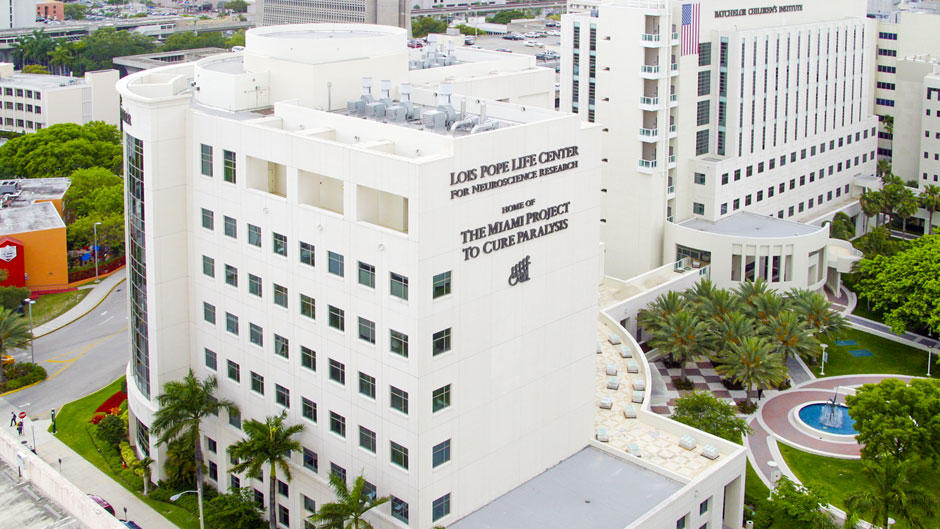After earning his undergraduate degree in biological science in May, Robert Cotter planned a rigorous gap year researching neurotrauma and working with spinal cord injury patients in Jacksonville. But the doors to both opportunities closed when the novel coronavirus began its march across the United States.
Now the Tarpon Springs, Florida, native who is applying to medical school to pursue a career as a physiatrist—a physician who helps patients recover from spinal cord injuries and other neurotrauma—counts himself lucky to be able to pursue his interests in a summer program for undergraduates at The Miami Project to Cure Paralysis, part of the University of Miami Miller School of Medicine. For the first time since its 2005 inception, the eight-week program is being conducted remotely, enabling 54 college students from across the nation—rather than the usual dozen or so—to participate.
“Despite the growing pandemic, it has been an awesome experience,” said Cotter, who was drawn to his medical career specialty after his brother suffered a paralyzing diving accident. “I’ve had the opportunity to interact with cutting-edge researchers who have helped me to hone my research interests and given me broad exposure to different fields and subtopics in neurotrauma. The program directors are awesome. The content is awesome. It’s really a fantastic experience. I’ve been blown away.”
The Miami Project typically buzzes with activity during the summer as young trainees like Cotter, who just completed his undergraduate studies at Florida State University, bring fresh excitement to the project’s laboratories in the Lois Pope LIFE Center. But like so many programs across the University, The Miami Project was forced to rethink all aspects of its research and training efforts, including how to continue providing opportunities that strengthen student interest in pursuing neurotrauma research while COVID-19 continues its spread around the world.
The unequivocal answer was to continue hosting the eight-week program through thrice-weekly Zoom sessions. Beginning on June 15, the sessions include lectures by the Miller School’s faculty experts and discussions with scientists who illuminate the breadth of The Miami Project’s research. Topics include the neurocognitive effects of concussion, pain in neurotrauma, biomedical engineering, and drug discovery. There are also career development sessions on such essential skills as writing grants and CVs, making effective presentations, and communicating science—which Cotter found very useful.
“No matter your experience level, there is always something new to learn, which I have,” Cotter said.
Although there are challenges associated with hosting dozens of students remotely, The Miami Project’s education coordinator, Maria Chagoyen, was well equipped to ensure a smooth transition. “Without Maria’s experience, organization, and enthusiasm for teaching, this quick shift to distance learning never would have been possible,” said Katie Gant, The Miami Project’s director of education and outreach and a research assistant professor in the Department of Neurological Surgery. “We have students joining us from across the country—from Maine to California—and she ensures they all are able to connect and have opportunities to interact one on one with our scientists.”
Despite the inherent limitations of remote interactions, Gant views the summer program’s expanded reach as a big advantage of the distance-learning model. “In the past, we were only able to host about 12 undergraduate students in our laboratories, despite receiving more than 100 applications each cycle,” she said. “This summer, we can accommodate dozens more, thanks to the accessibility of these remote platforms. We do, however, have to be more creative with our teaching methods to encourage engagement and discussion despite our physical distance. We are already thinking about ways to reach even more trainees in the future.”
And that may prove to be another silver lining from the pandemic. Since its founding in 1985, The Miami Project has trained countless undergraduate students in its laboratories who have gone on to advance the field of neuroscience—which has always been one of The Miami Project’s primary goals. So, even without trainees buzzing through the Lois Pope LIFE Center this summer, Gant is encouraged by how many young people are interested in improving the lives of others, particularly those living with spinal cord and traumatic brain injuries, as well as other neurological disorders.
“We want this summer program to serve as a springboard, to give students the tools they need to pursue careers in neuroscience,” she said. “The Miami Project is proud to be part of the development of these future scientists who will move us closer to our ultimate goal of curing paralysis.”

